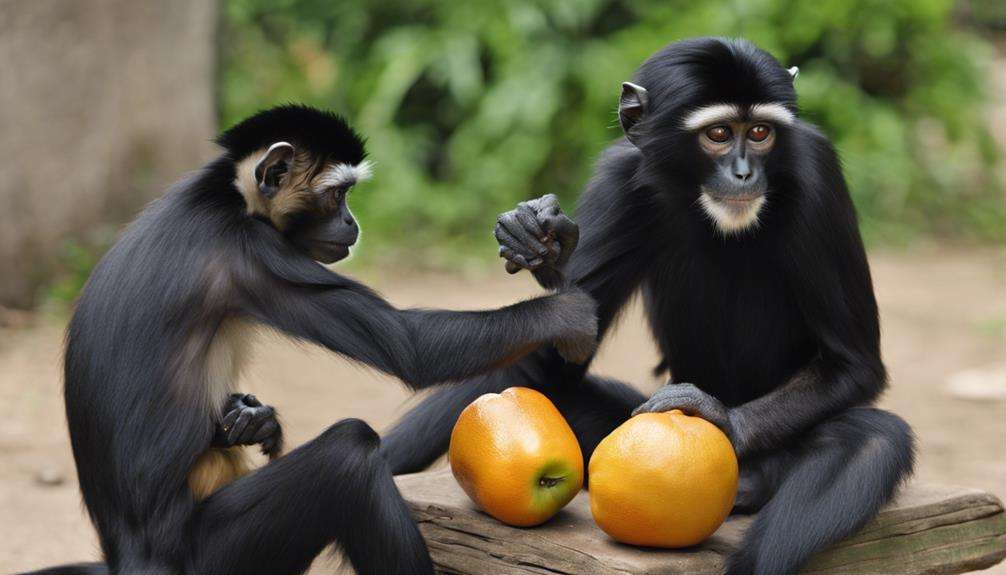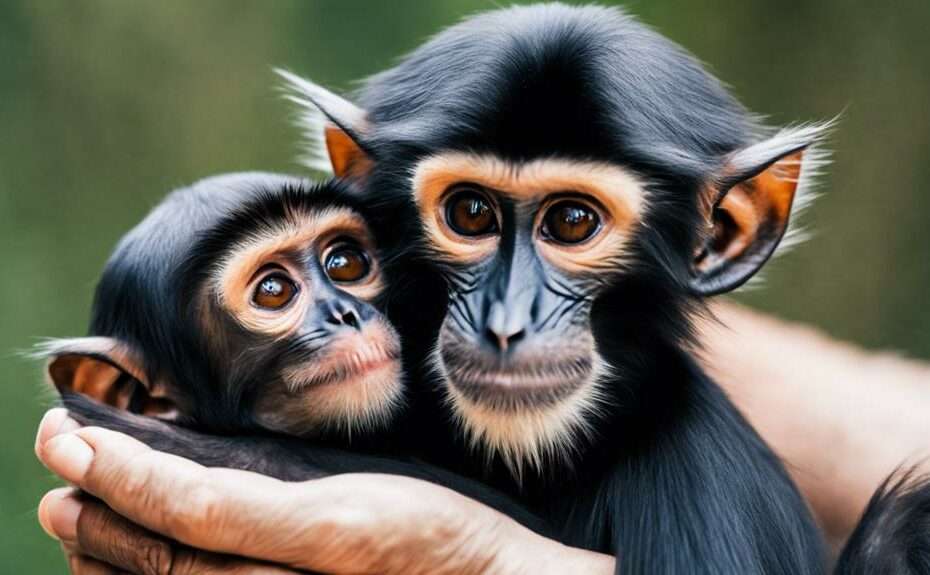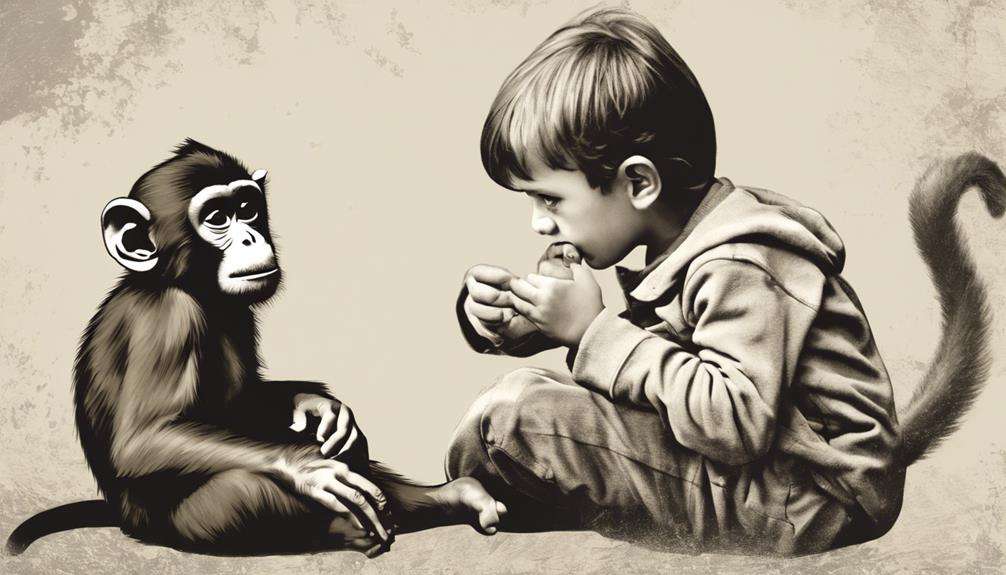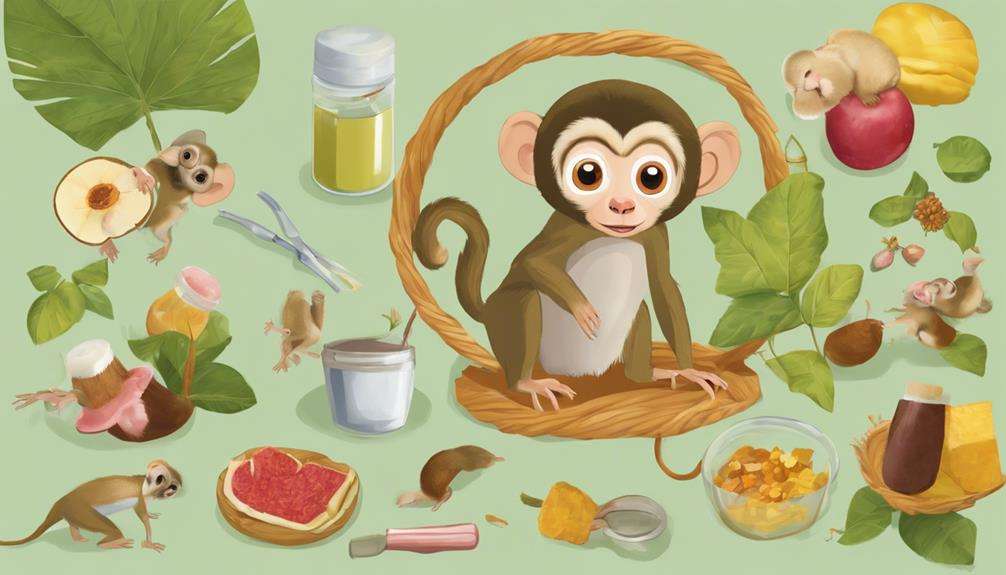Did you know that spider monkeys are highly intelligent and form deep emotional connections with their human caregivers?
Understanding the unique social dynamics and emotional needs of these fascinating creatures is essential in building a strong bond with your pet spider monkey.
By implementing specific strategies and taking the time to nurture your relationship, you'll not only enhance your monkey's well-being but also create a meaningful connection that will last a lifetime.
Key Takeaways
- Regular grooming sessions and positive reinforcement enhance trust and bonding.
- Enrich the monkey's environment with climbing structures and interactive toys.
- Prioritize health with vet check-ups, balanced diet, and mental stimulation.
- Respect boundaries, observe body language, and use positive reinforcement for strong connections.
Understanding Your Pet Spider Monkey
Understanding your pet spider monkey begins with recognizing their highly intelligent nature and complex social structures. These social animals thrive on interactions within their groups, displaying intricate forms of communication through vocalizations, gestures, and grooming behaviors. Social interaction is crucial for spider monkeys as they establish hierarchies, maintain bonds, and navigate their dynamic social dynamics.
When observing your pet spider monkey, you may notice how they cooperate to forage for food, utilizing their dexterous hands and keen eyesight to locate fruits, leaves, nuts, and insects in their environment.
In the wild, spider monkeys rely on their social skills to survive and thrive, as they work together to find food sources and evade predators like pumas, jaguars, snakes, and eagles. By understanding the significance of social interaction in their daily lives, you can better appreciate the importance of providing opportunities for your pet spider monkey to engage in natural behaviors within their captive environment.
Establishing Trust and Bonding
Regular grooming sessions with your pet spider monkey play an essential role in fostering trust and strengthening the bond between you and your primate companion. Through gentle grooming, you establish a routine of physical contact that helps your spider monkey feel cared for and secure. This repetitive behavior builds familiarity and comfort, which are foundations for trust in your relationship.
Additionally, grooming allows you to observe your spider monkey's body language cues, enhancing your understanding of its preferences and emotions, thereby facilitating effective communication.
When interacting with your spider monkey, focus on positive reinforcement techniques to reinforce desired behaviors and create a supportive environment for trust to develop. Respect your spider monkey's boundaries and avoid punitive measures, as these actions can erode trust and hinder bonding.
Enriching Your Spider Monkey's Environment

To enhance the well-being of your spider monkey, providing climbing structures and interactive toys is essential. These elements encourage natural behaviors like swinging, jumping, and climbing, offering both mental and physical stimulation.
Creating an enriching environment with opportunities for exploration and movement will contribute to your spider monkey's overall health and happiness.
Cage Enrichment Tips
How can you enhance your spider monkey's cage environment to promote natural behaviors and mental stimulation effectively?
To achieve this, provide a variety of climbing structures within the cage. Spider monkeys are arboreal creatures in the wild, spending most of their time in trees. By incorporating branches, ropes, and swings, you can offer opportunities for climbing and swinging, mimicking their natural habitat.
Introducing new toys regularly can keep your spider monkey mentally engaged. Including hiding spots and foraging opportunities can encourage natural behaviors and provide enrichment.
Puzzle feeders and interactive toys won't only stimulate problem-solving skills but also promote physical activity.
Interactive Toy Ideas
Enhance your spider monkey's environment with interactive toys that stimulate their natural behaviors and provide mental and physical enrichment. Pet monkeys, like their wild counterparts, thrive on activities that engage their instincts to move around and explore.
Providing puzzle feeders and foraging toys taps into their hunting instincts, while interactive items such as rope swings and ladders encourage physical activity and play. Rotating toys regularly is crucial to prevent boredom and keep your spider monkey mentally engaged.
Hide treats inside toys to promote problem-solving skills and mental stimulation, offering a rewarding challenge. Including toys that encourage climbing and swinging helps mimic the spider monkey's natural habitat, providing a stimulating environment for these domestic animals.
Communicating Effectively With Your Monkey
Understanding the body language and tone of voice of monkeys, including spider monkeys, is essential for effective communication. Monkeys rely heavily on nonverbal cues to express their emotions and intentions. By observing their body language cues and vocal tones, you can better understand what your spider monkey is trying to communicate.
Positive reinforcement techniques play a vital role in fostering clear communication with your monkey. By rewarding desired behaviors with treats or praise, you can reinforce positive communication patterns. Additionally, setting clear boundaries is vital in establishing a harmonious relationship with your spider monkey. Avoid punishment and instead focus on positive reinforcement to create a safe and trusting environment for communication.
Respect your monkey's boundaries and needs to build a strong foundation for effective communication. By honing in on these techniques, you can strengthen your bond with your spider monkey and vital a mutually beneficial relationship based on clear communication and trust.
Training and Socializing Your Spider Monkey

Training and socializing your spider monkey using positive reinforcement techniques is important for building trust and effective communication. Enrichment activities like interactive play sessions, climbing, and swinging provide mental stimulation and strengthen the bond with your spider monkey.
Socialization techniques, such as supervised interactions with other monkeys or humans, help fulfill their social needs. Trust building exercises, like respecting your spider monkey's boundaries and avoiding punishment during training, create a safe and trusting environment. Communication skills can be enhanced through consistent training and positive interactions.
Additionally, incorporating grooming sessions into your routine mimics natural bonding behaviors and deepens the connection with your spider monkey. By implementing these strategies, you can establish a strong relationship with your pet spider monkey, ensuring their well-being and happiness.
Providing Proper Nutrition and Care
Spider monkeys require a diverse diet consisting of fruits, leaves, flowers, nuts, and insects to maintain their health. Providing a spacious and stimulating environment with opportunities for climbing and swinging is essential for their well-being.
Regular veterinary check-ups and a specialized diet are important for ensuring the longevity and health of pet spider monkeys.
Balanced Diet Essentials
A balanced diet is essential for ensuring the health and well-being of captive spider monkeys. These primates have specific dietary requirements that include a variety of foods such as fruits, leaves, flowers, nuts, and insects to maintain nutritional balance.
Mimicking their natural foraging behavior in the wild is important, as it not only provides the necessary nutrients but also offers enrichment. Failure to provide a diverse diet may lead to health implications like nutrient deficiencies in spider monkeys.
To prevent such issues, consulting with a veterinarian or animal nutritionist is advisable to develop a tailored diet plan that meets the individual needs of your pet spider monkey. Prioritizing a balanced diet is key to promoting the overall health and vitality of these animals in captivity.
Enriching Environment Setup
Creating an enriching environment for pet spider monkeys involves ensuring their nutritional needs are met through a tailored diet plan and providing ample space for social interaction and stimulation. Spider monkeys thrive on a diet rich in fruits, leaves, flowers, nuts, and insects.
To enhance their well-being, outdoor play areas should be incorporated into their living space, allowing for physical activity and natural behaviors. Providing foraging opportunities, such as hiding food or treats, can stimulate their minds and keep them engaged.
Naturalistic enclosures with trees, ropes, and platforms mimic their wild habitat, promoting climbing and exploration. These environmental enrichments are essential for the overall health and happiness of pet spider monkeys, ensuring they lead fulfilling lives in captivity.
Regular Health Check-Ups
Shifting from the enrichment of their environment, ensuring the best health and nutrition of your pet spider monkey involves scheduling regular veterinary check-ups to monitor their well-being. Preventive care is essential to detect any health issues early.
Behavioral patterns can provide valuable insights into your spider monkey's well-being. Nutrition monitoring, including a balanced diet of fruits, vegetables, nuts, and insects, is vital for their overall health. Weight management is key to prevent obesity-related issues.
Additionally, incorporating exercise routines and mental stimulation activities can promote good physical and mental health. By following recommended vaccination schedules and parasite prevention measures, you can maintain your spider monkey's well-being and strengthen your bond with them.
Health and Wellness for Your Monkey
Regular veterinary check-ups play an essential role in monitoring your spider monkey's health and detecting potential issues early on.
Mental stimulation is important for your monkey's well-being; consider providing puzzles or interactive toys to keep their mind engaged.
Incorporating exercise routines like climbing structures and toys can help maintain your spider monkey's physical health.
Additionally, make sure you maintain a balanced diet consisting of fruits, vegetables, nuts, and insects to support overall wellness.
Proper hygiene practices, such as regular grooming and cleaning of their living space, are important in preventing illnesses.
Consistently monitor your spider monkey's behavior for any changes as it can indicate stress, discomfort, or underlying health issues that may require attention.
Frequently Asked Questions
How Do You Bond With a Monkey?
To bond with a monkey, engage in interactive play for enrichment. Mimic grooming to build trust. Offer varied foods for communal feeding experiences. Use positive reinforcement for training. Respect boundaries for effective communication. Monkey enrichment, training, and communication are key.
How Do Spider Monkeys Show Affection?
Spider monkeys show affection through grooming each other for cleanliness, sharing food in communal feeding, playing like chasing and wrestling, physical closeness by hugging and holding hands, and using vocalizations such as cooing sounds for communication within their group.
Are Spider Monkeys Friendly With Humans?
Spider monkey behavior reveals they can be friendly with humans through proper social interactions. Establishing trust is crucial. Careful handling and positive engagement help foster bonds. Respect their space and needs for a harmonious relationship.
Do Monkeys Get Attached to Humans?
Monkeys do form emotional attachments to humans through trust building and regular interaction. Monkey emotions include seeking proximity, grooming, and vocalizations. Positive human interaction, like feeding and play, contributes to strong bonds between monkeys and humans.
Conclusion
To sum up, building a strong connection with your pet spider monkey is essential for their well-being and happiness.
Did you know that spider monkeys spend up to 70% of their time in the wild socializing with other monkeys?
By understanding their social nature and engaging in activities that promote bonding and trust, you can create a fulfilling and enriching relationship with your spider monkey.
Remember, positive interactions and effective communication are key to fostering a strong connection with your primate companion.






